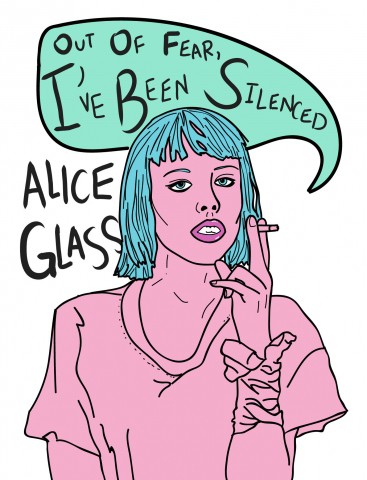 The abuse of musicians at the hands of their producers is commonplace in a music industry that is systemically sexist, and the inherent power dynamics in the producer-vocalist relationship are symptomatic of the misogyny that pervades the music industry.
The abuse of musicians at the hands of their producers is commonplace in a music industry that is systemically sexist, and the inherent power dynamics in the producer-vocalist relationship are symptomatic of the misogyny that pervades the music industry.
In 2014, Alice Glass, the singer of the electronic band Crystal Castles, announced she was departing from the band, citing professional and personal concerns. However, on Oct. 24, she revealed that her motivation for quitting the band arose due to more than a decade of abuse, which she suffered at the hands of her bandmate, that began when she was about 15 years old.
Glass’ statement was a heart-breaking and shocking revelation to fans, but the reality is that the abuse Glass suffered was not a one-off incident in the music industry. In 2016, coverage of artist Kesha’s legal battle with Dr. Luke saturated the news after she revealed that the producer had been abusing her since she was 18 years old. Men like Kath and Dr. Luke are cretins, and it’s a sad truth that they occupy so much space in the music industry.
Kath’s weak defence in response to Glass’s statement was simple: “There are many witnesses who can and will confirm that I was never abusive to Alice.” There is no such thing as an omnipresent witness — that excuse is pathetic. Kath released a statement on Nov. 3 declaring that he is suing Glass for defamation. He’s chosen to blame Glass’s mental health rather than take responsibility for the allegations against him.
The experiences of Kesha and Glass evidently highlight the capacity that producers in the industry have to abuse musicians. We need to call out the music industry as a whole for the way that women are treated, given that the exploitation of females in music is wide-spread.
Ask any girl who attends gigs about her experiences, and you’ll discover the depressing reality that, for some unknown reason, creepy men think a concert ticket also works as a licence to sexually assault women. Predators thrive in a gig environment — it promises them anonymity, and thus, the freedom to grope without facing repercussions.
Sadly, the concert experience is not a safe space for women — and it is not much safer on stage. I am a bit of a HAIM fan girl — I have been to four of their shows, and at every single one, the members of HAIM were verbally attacked with crude heckles.
Women have such a horrendous time in the music industry. Any woman who dares to engage with music has to battle against patriarchal forces that either try to exploit them or keep them on the periphery of the scene.
In 2015, the reaction of fans to the news that Florence + The Machine were to replace Foo Fighters as the Glastonbury Festival headliners was an archetypal example of how the talent of female musicians is continually undermined. Many fans were furious at the announcement, claiming that Florence Welch was not a worthy replacement and not ready to headline the festival.
What a ridiculous reaction — Welch is one of the best vocalists in contemporary music and a refreshing change from the generic, straight white male musicians who always saturate the festival circuit.
Beyoncé will headline Coachella in 2018 — which is the first time in 11 years that the festival has booked a female- identified individual for the top spot. Why was there a decade of masculine domination, when there are a plethora of female-identified individuals who are killing it in the industry? It is undeniable that women have to work much harder than their male counterparts in order to be taken seriously as musicians.
Sexism is undoubtedly an issue in the music industry, but we can remain optimistic about the progress that has been made. Women are no longer staying silent — the #MeToo social media movement has inspired Alice Glass and many other women to share their experiences.
Moving into the future, we need to call out sexual predators and make an example of the gig gropers who try to sexually assault people, and we need to give the women who continue to slay the music scene the recognition that they deserve.
—
Marianne Holt
Graphic: Lesia Karalash / Graphics Editor